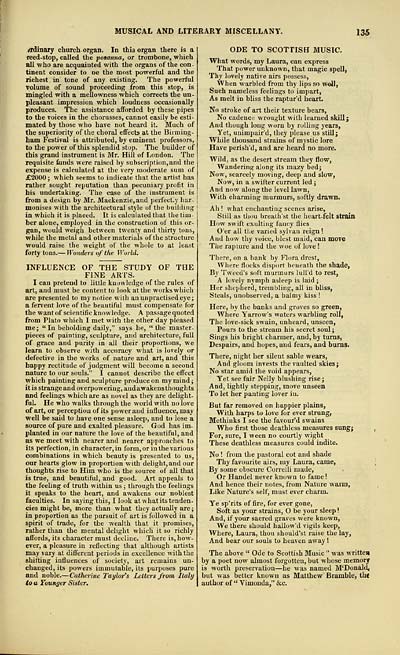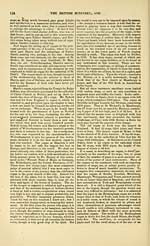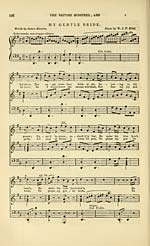Glen Collection of printed music > Printed music > British minstrel, and musical and literary miscellany
(473) Page 135
Download files
Complete book:
Individual page:
Thumbnail gallery: Grid view | List view

MUSICAL AND LITERARY MISCELLANY.
135
ordinary church-organ. In this organ there is a
reed-stop, called the poaanna, or trombone, which
all who are acquainted with the organs of the con-
tinent consider to oe the most powerful and the
richest in tone of any existing. The powerful
volume of sound proceeding from this stop, is
mingled with a mellowness which corrects the un-
pleasant impression which loudness occasionally
produces. The assistance afforded by these pipes
to the voices in the chorusses, cannot easily be esti-
mated by those who have not heard it. Much of
the superiority of the choral effects at the Birming-
ham Festival is attributed, by eminent professors,
to the power of this splendid stop. The builder of
this grand instrument is Mr. Hill of London. The
requisite funds were raised by subscription, and the
expense is calculated at the very moderate sum of
£2000 ; which seems to indicate that the artist has
rather sought reputation than pecuniary profit in
his undertaking. The case of the instrument is
from a design by Mr. Mackenzie, and perfectly har-
monises with the architectural style of the building
in which it is placed. It is calculated that the tim-
ber alone, employed in the construction of this or-
gan, would weigh between twenty and thirty tons,
while the metal and other materials of the structure
would raise the weight of the whole to at least
forty tons. — Wonders of the Wurld.
INFLUENCE OF THE STUDY OF THE
FINE ARI'S.
I can pretend to little knowledge of the rules of
art, and must be content to look at the works which
are presented to my notice with an unpractised eye;
a fervent love of the beautiful must compensate for
the want of scientific knowledge. A passage quoted
from Plato which I met with the other day pleased
me; " In beholding daily," says he, " the master-
pieces of painting, sculpture, and architecture, full
of grace and purity in all their proportions, we
learn to observe with accuracy what is lovely or
defective in the works of nature and art, and this
happy rectitude of judgment will become a second
nature to our souls." I cannot describe the efl'ect
which painting and sculpture produce on my mind;
it is strange and overpowering, andawakens thoughts
and feelings which are as novel as tliey are delight-
ful. He who walks through the world with no love
of art, or perception of its power and influence, may
well he said to have one sense asleep, and to lose a
source of pure and exalted pleasure. God has im-
planted in our nature the love of the beautiful, and
as we meet with nearer and nearer approaches to
its perfection, in character, in form, or in the various
combinations in which beauty is presented to us,
our hearts glow in proportion with delight, and our
thoughts rise to Him who is the source of all that
is true, and beautiful, and good. Art appeals to
the feeling of truth within us ; through the feelings
it speaks to the heart, and awakens our noblest
faculties. In saying this, I look at what its tenden-
cies might be, more than what they actually are ;
in proportion as the pursuit of art is followed in a
spirit of trade, for the wealth that it promises,
rather than the mental delight which it so richly
affords, its character must decline. There is, how-
ever, a pleasure in reflecting that although artists
may vary at different periods in excellence with the
shifting influences of society, art remains un-
changed, its powers immutable, its purposes pure
and noble. — Catherine Taylor's Letters from Italy
to a Younger Sister.
ODE TO SCOTTISH MUSIC.
What words, my Laura, can express
That power unknown, that magic spell,
Thy lovely native airs possess,
When warbled from thy lips so w«ll,
Such nameless feelings to impart,
As melt in bliss the raptur'd heart.
No stroke of art their texture bears.
No cadencu wrought with learned skill;
And though long worn by rolling years,
Yet, unimpair'd, they please us still;
While thousand strains of mystic lore
Have perish'd, and are heard no more.
Wild, as the desert stream they flow,
Wandering along its mazy bed;
Now, scarcely moving, deep and slow,
Now, in a swifter current led ;
And now along the level lawn.
With charming murmurs, softly drawn.
Ah ! what enchanting scenes arise,
Still as tliou hrealh'st the heart-felt strain
How swift exulting fancy flies
O'er all tde varied sylvan reign !
And how thy voice, blest maid, can more
Tlie rapiure and the woe of love !
There, on a bank by Flora drest,
Where flocks disport beneath the shade,
By Tweed's soft murmurs luU'd to rest,
A lovely nymph asleep is laid ;
Her shepherd, trembling, all in bliss,
Steals, unobserved, a balmy kiss !
Here, by the banks and groves so green,
where Yarrow's waters warbling roll.
The love-sick swain, unheard, unseen.
Pours to the stream his secret soul ;
Sings his bright charmer, and, by turns,
Despairs, and hopes, and fears, and bums-
There, night her silent sable wears.
And gloom invests the vaulted skies ;
No star amid the void appears.
Yet see fair Nelly blushing rise ;
And, lightly stepping, move unseen
To let her panting lover in.
But far removed on happier plains.
With harps to love for ever strung,
Methiuks I see the fayour'd swains
Who first those deathless measures sung;
For, sure, I ween no courtly wight
These deathless measures could indite.
No ! from the pastoral cot and shade
Thy favourite airs, my Laura, came.
By some obscure Correlli made.
Or Handel never known to fame!
And hence their notes, from Nature warm,
Like Nature's self, must ever charm.
Ye sp'rits of fire, for ever gone.
Soft as your strains, O be your sleep !
And, if your sacred graves were known.
We there should hallow'd vigils keep.
Where, Laura, thou should'st raise the lay.
And bear our souls to heaven away I
The above " Ode to Scottish Music" was written
by a poet now almost forgotten, but whose memory
is worth preservation — he was named M'Donald,
but was better known as Matthew Bramble, th«
author of" Vimonda," &c.
135
ordinary church-organ. In this organ there is a
reed-stop, called the poaanna, or trombone, which
all who are acquainted with the organs of the con-
tinent consider to oe the most powerful and the
richest in tone of any existing. The powerful
volume of sound proceeding from this stop, is
mingled with a mellowness which corrects the un-
pleasant impression which loudness occasionally
produces. The assistance afforded by these pipes
to the voices in the chorusses, cannot easily be esti-
mated by those who have not heard it. Much of
the superiority of the choral effects at the Birming-
ham Festival is attributed, by eminent professors,
to the power of this splendid stop. The builder of
this grand instrument is Mr. Hill of London. The
requisite funds were raised by subscription, and the
expense is calculated at the very moderate sum of
£2000 ; which seems to indicate that the artist has
rather sought reputation than pecuniary profit in
his undertaking. The case of the instrument is
from a design by Mr. Mackenzie, and perfectly har-
monises with the architectural style of the building
in which it is placed. It is calculated that the tim-
ber alone, employed in the construction of this or-
gan, would weigh between twenty and thirty tons,
while the metal and other materials of the structure
would raise the weight of the whole to at least
forty tons. — Wonders of the Wurld.
INFLUENCE OF THE STUDY OF THE
FINE ARI'S.
I can pretend to little knowledge of the rules of
art, and must be content to look at the works which
are presented to my notice with an unpractised eye;
a fervent love of the beautiful must compensate for
the want of scientific knowledge. A passage quoted
from Plato which I met with the other day pleased
me; " In beholding daily," says he, " the master-
pieces of painting, sculpture, and architecture, full
of grace and purity in all their proportions, we
learn to observe with accuracy what is lovely or
defective in the works of nature and art, and this
happy rectitude of judgment will become a second
nature to our souls." I cannot describe the efl'ect
which painting and sculpture produce on my mind;
it is strange and overpowering, andawakens thoughts
and feelings which are as novel as tliey are delight-
ful. He who walks through the world with no love
of art, or perception of its power and influence, may
well he said to have one sense asleep, and to lose a
source of pure and exalted pleasure. God has im-
planted in our nature the love of the beautiful, and
as we meet with nearer and nearer approaches to
its perfection, in character, in form, or in the various
combinations in which beauty is presented to us,
our hearts glow in proportion with delight, and our
thoughts rise to Him who is the source of all that
is true, and beautiful, and good. Art appeals to
the feeling of truth within us ; through the feelings
it speaks to the heart, and awakens our noblest
faculties. In saying this, I look at what its tenden-
cies might be, more than what they actually are ;
in proportion as the pursuit of art is followed in a
spirit of trade, for the wealth that it promises,
rather than the mental delight which it so richly
affords, its character must decline. There is, how-
ever, a pleasure in reflecting that although artists
may vary at different periods in excellence with the
shifting influences of society, art remains un-
changed, its powers immutable, its purposes pure
and noble. — Catherine Taylor's Letters from Italy
to a Younger Sister.
ODE TO SCOTTISH MUSIC.
What words, my Laura, can express
That power unknown, that magic spell,
Thy lovely native airs possess,
When warbled from thy lips so w«ll,
Such nameless feelings to impart,
As melt in bliss the raptur'd heart.
No stroke of art their texture bears.
No cadencu wrought with learned skill;
And though long worn by rolling years,
Yet, unimpair'd, they please us still;
While thousand strains of mystic lore
Have perish'd, and are heard no more.
Wild, as the desert stream they flow,
Wandering along its mazy bed;
Now, scarcely moving, deep and slow,
Now, in a swifter current led ;
And now along the level lawn.
With charming murmurs, softly drawn.
Ah ! what enchanting scenes arise,
Still as tliou hrealh'st the heart-felt strain
How swift exulting fancy flies
O'er all tde varied sylvan reign !
And how thy voice, blest maid, can more
Tlie rapiure and the woe of love !
There, on a bank by Flora drest,
Where flocks disport beneath the shade,
By Tweed's soft murmurs luU'd to rest,
A lovely nymph asleep is laid ;
Her shepherd, trembling, all in bliss,
Steals, unobserved, a balmy kiss !
Here, by the banks and groves so green,
where Yarrow's waters warbling roll.
The love-sick swain, unheard, unseen.
Pours to the stream his secret soul ;
Sings his bright charmer, and, by turns,
Despairs, and hopes, and fears, and bums-
There, night her silent sable wears.
And gloom invests the vaulted skies ;
No star amid the void appears.
Yet see fair Nelly blushing rise ;
And, lightly stepping, move unseen
To let her panting lover in.
But far removed on happier plains.
With harps to love for ever strung,
Methiuks I see the fayour'd swains
Who first those deathless measures sung;
For, sure, I ween no courtly wight
These deathless measures could indite.
No ! from the pastoral cot and shade
Thy favourite airs, my Laura, came.
By some obscure Correlli made.
Or Handel never known to fame!
And hence their notes, from Nature warm,
Like Nature's self, must ever charm.
Ye sp'rits of fire, for ever gone.
Soft as your strains, O be your sleep !
And, if your sacred graves were known.
We there should hallow'd vigils keep.
Where, Laura, thou should'st raise the lay.
And bear our souls to heaven away I
The above " Ode to Scottish Music" was written
by a poet now almost forgotten, but whose memory
is worth preservation — he was named M'Donald,
but was better known as Matthew Bramble, th«
author of" Vimonda," &c.
Set display mode to: Large image | Transcription
Images and transcriptions on this page, including medium image downloads, may be used under the Creative Commons Attribution 4.0 International Licence unless otherwise stated. ![]()
| Special collections of printed music > Glen Collection of printed music > Printed music > British minstrel, and musical and literary miscellany > (473) Page 135 |
|---|
| Permanent URL | https://digital.nls.uk/91440621 |
|---|
| Description | Scottish songs and music of the 18th and early 19th centuries, including music for the Highland bagpipe. These are selected items from the collection of John Glen (1833 to 1904). Also includes a few manuscripts, some treatises, and other books on the subject. |
|---|
| Description | The Glen Collection and the Inglis Collection represent mainly 18th and 19th century Scottish music, including Scottish songs. The collections of Berlioz and Verdi collected by bibliographer Cecil Hopkinson contain contemporary and later editions of the works of the two composers Berlioz and Verdi. |
|---|

